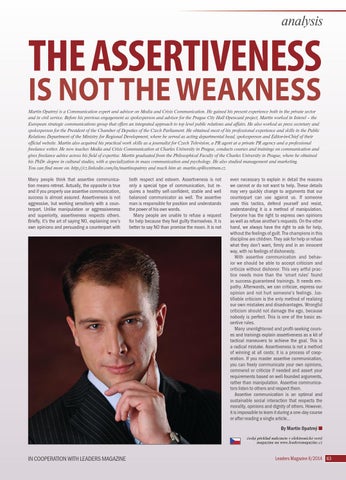analysis
THE ASSERTIVENESS
IS NOT THE WEAKNESS Martin Opatrný is a Communication expert and advisor on Media and Crisis Communication. He gained his present experience both in the private sector and in civil service. Before his previous engagement as spokesperson and advisor for the Prague City Hall Opencard project, Martin worked in Interel – the European strategic communications group that offers an integrated approach to top level public relations and affairs. He also worked as press secretary and spokesperson for the President of the Chamber of Deputies of the Czech Parliament. He obtained most of his professional experience and skills in the Public Relations Department of the Ministry for Regional Development, where he served as acting departmental head, spokesperson and Editor-in-Chief of their official website. Martin also acquired his practical work skills as a journalist for Czech Television, a PR agent at a private PR agency and a professional freelance writer. He now teaches Media and Crisis Communication at Charles University in Prague, conducts courses and trainings on communication and gives freelance advice across his field of expertise. Martin graduated from the Philosophical Faculty of the Charles University in Prague, where he obtained his PhDr. degree in cultural studies, with a specialization in mass communication and psychology. He also studied management and marketing. You can find more on: http://cz.linkedin.com/in/martinopatrny and reach him at: martin.op@centrum.cz. Many people think that assertive communication means retreat. Actually, the opposite is true and if you properly use assertive communication, success is almost assured. Assertiveness is not aggressive, but working sensitively with a counterpart. Unlike manipulation or aggressiveness and superiority, assertiveness respects others. Briefly, it’s the art of saying NO, explaining one’s own opinions and persuading a counterpart with
both respect and esteem. Assertiveness is not only a special type of communication, but requires a healthy self-confident, stable and well balanced communicator as well. The assertive man is responsible for position and understands the power of his own words. Many people are unable to refuse a request for help because they feel guilty themselves. It is better to say NO than promise the moon. It is not
even necessary to explain in detail the reasons we cannot or do not want to help. These details may very quickly change to arguments that our counterpart can use against us. If someone uses this tactics, defend yourself and resist, understanding it is a method of manipulation. Everyone has the right to express own opinions as well as refuse another’s requests. On the other hand, we always have the right to ask for help, without the feelings of guilt. The champions in this discipline are children. They ask for help or refuse what they don’t want, firmly and in an innocent way, with no feelings of dishonesty. With assertive communication and behavior we should be able to accept criticism and criticize without dishonor. This very artful practice needs more than the ‘smart rules’ found in success-guaranteed trainings. It needs empathy. Afterwards, we can criticize, express our opinion and not hurt someone’s feelings. Justifiable criticism is the only method of realizing our own mistakes and disadvantages. Wrongful criticism should not damage the ego, because nobody is perfect. This is one of the basic assertive rules. Many unenlightened and profit-seeking courses and trainings explain assertiveness as a kit of tactical maneuvers to achieve the goal. This is a radical mistake. Assertiveness is not a method of winning at all costs; it is a process of cooperation. If you master assertive communication, you can freely communicate your own opinions, commend or criticize if needed and assert your requirements based on well-founded arguments, rather than manipulation. Assertive communicators listen to others and respect them. Assertive communication is an optimal and sustainable social interaction that respects the morality, opinions and dignity of others. However, it is impossible to learn it during a one-day course or after reading a single article… By Martin Opatrný ■ český překlad naleznete v elektronické verzi magazínu na www.leadersmagazine.cz
IN COOPERATION WITH LEADERS MAGAZINE
Leaders Magazine II/2014 63
